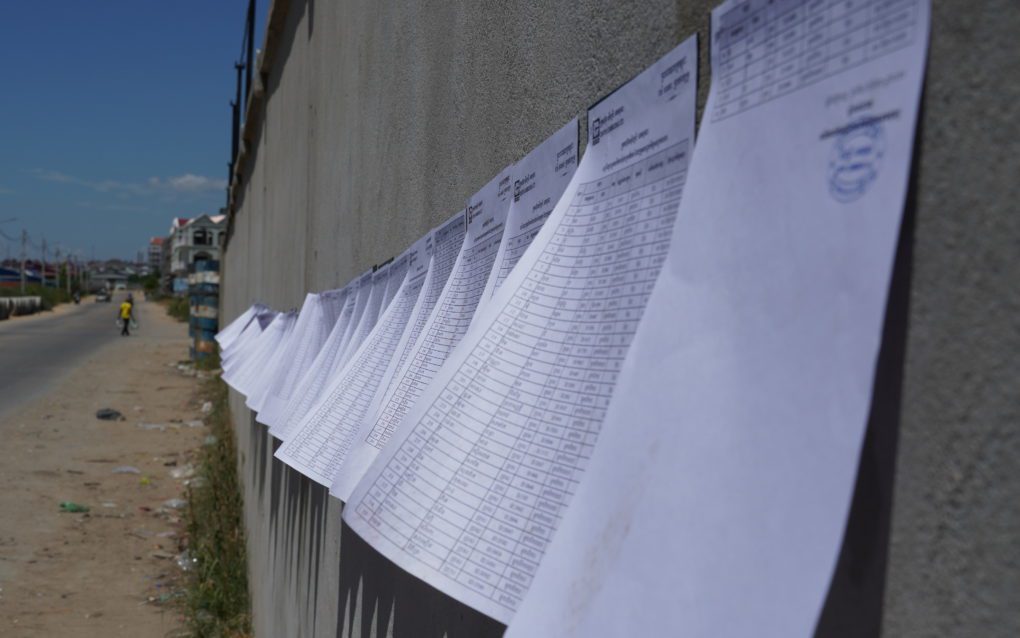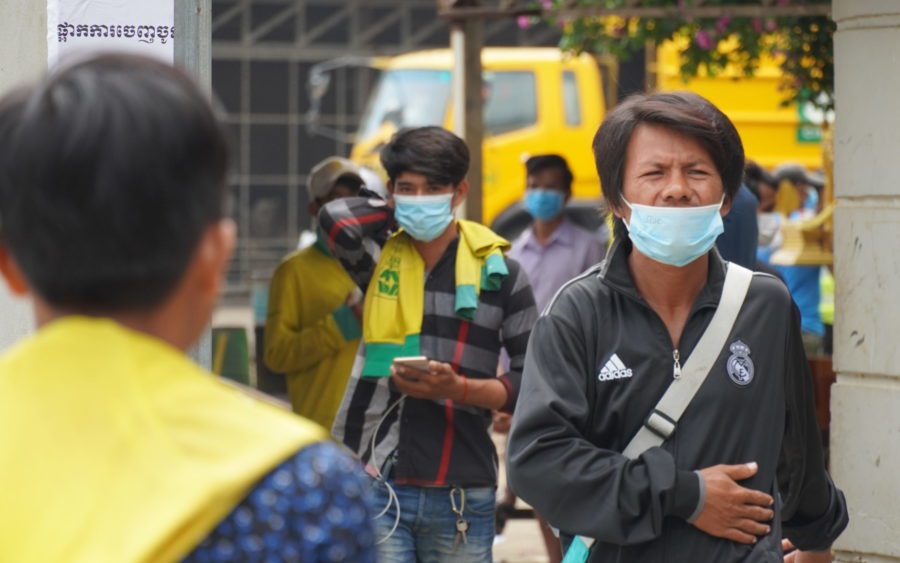Union activists say hundreds of laid-off Cintri workers still haven’t received new jobs, violating a promise from Phnom Penh City Hall, as the beleaguered trash collection company disposed of more than 1,000 workers amid a transition for the city’s waste management.
Cintri announced more than 1,000 layoffs via posted names on its garage gates on Thursday, workers said, as Phnom Penh City Hall announced the entry of two new garbage companies — Chinese-owned Mizuda Sanitation and Singaporean 800 Super — as of the same day. City Hall split the three companies’ trash collection routes by districts late last month, but it had previously said that all workers would retain their jobs.
Cintri union leader Kao Sokwat claimed hundreds of workers were not able to get jobs amid the transition, though he didn’t know the exact number because they were dispersed across the city. He added that all four union leaders and 13 union activists had lost their jobs, dealing a blow to labor rights representation in the sector.
He said he’s seeking intervention from City Hall over the lost jobs, but he’s not hopeful.
“The law in Cambodia is based on the lips of those in power,” he said.
The laid-off workers gathered at a Dangkao district Cintri garage on Tuesday, Sokwat added, because they didn’t receive full pay. The leader, who also lost his job, said the terminated workers were receiving one month of pay but would still be owed a half month of wages. Cintri were asking workers to turn in their employee identification cards in order to receive the one-month payment, leaving workers afraid they would not receive or be able to collect the remaining half-month salary owed to them. Several workers at the gathering confirmed that they had been laid off but had not received new jobs at the other companies.
One truck driver told VOD on Friday that the company appeared to be bracing for conflict with the workers when individuals showed up to check their employment status posted on the garage’s gate the day before. While he was at the garage, he saw people in white uniforms — who were not Cintri employees — taking the trucks out of the garage in order to prevent workers from damaging or commandeering property.
The laid-off driver did not want to give his name because he feared the company wouldn’t pay his last salary if he spoke out. The driver said he was warned to find a new job before the layoffs, but he was also asked to sign an agreement that he would be fined $1,000 if he left during his last short-term contract.
“All of my district leaders had moved to the new companies. I was told to go [find a new job] too at that time, but I said I am honest with the company. I don’t want somebody criticizing that we change [jobs] to anywhere else,” he said. “Unfortunately, now they have abandoned us.”

Sokwat, the local union leader, said he was not worried about the loss of his job, but he did fear how workers would be treated once the union was dismantled by layoffs. He expected more labor rights violations and exploitative behavior by all garbage companies if workers did not have a union to defend themselves.
“Sometimes at night, drunk [drivers] come and hit us from behind, killing workers or breaking our arms and legs, and if there is no union to protect them, it will be difficult for them to find compensation,” he said. “[Workers] will be abused because they lack enough knowledge to advocate for their benefits. They have a limited knowledge [of labor rights].”
Rather than seeking new jobs when the layoffs were impending, many workers wanted to retain work with their employer, Sokwat said.
One former Cintri worker and union activist told VOD on Monday that he applied to work for Mizuda two months ago, as he feared he would be fired and didn’t believe City Hall’s promise to retain the jobs. He was hired last month, but claimed it was only because the company didn’t know he was part of the union — he and other former union members say the two companies are discriminating against former Cintri workers who were active in the union.
His new employer was more strict, but it provided a higher salary and promised more benefits than Cintri.
“I feel regret for those who lost their hard-working jobs with Cintri that they held for a long time,” he said. “In the end, it was irresponsible as the company [Cintri] did not get involved in pushing the new companies to get them to work as promised to the union leaders and City Hall.”
VOD could not reach City Hall spokesperson Met Measpheakdey, deputy Phnom Penh governor Keut Chhe, nor Phnom Penh governor Khuong Sreng. Cintri president Seng Savy and Gaea Waste Management’s human resources manager Chi Von also could not be reached.
Emails to 800 Super went unanswered, but Seang Samutmeas, an assistant representative for Mizuda, told VOD last week that the company hired more than 500 workers and had no plans to recruit any more workers at this time.
Touch Kosal, president of the Cambodian Tourism Workers’ Union Federation, said that City Hall had promised that workers would keep their jobs through the changes in waste management companies, after the union ended its 10-day-long strike in October over losing compensation at the end of their contracts.
Kosal suggested the garbage workers’ situation could be a violation of the Law on Trade Unions, noting that Cintri shed all its union members and the other two companies appeared to discriminate against union workers.
“In each workplace, if there is no union representing them, the working conditions are not good, and there may be a violation of working conditions by the employer,” he said. “If there is a union, it will protect and ensure the interests of workers. But if the company wants to dissolve the union, then I am worried about abuse, exploitation, and persecution of workers.”













